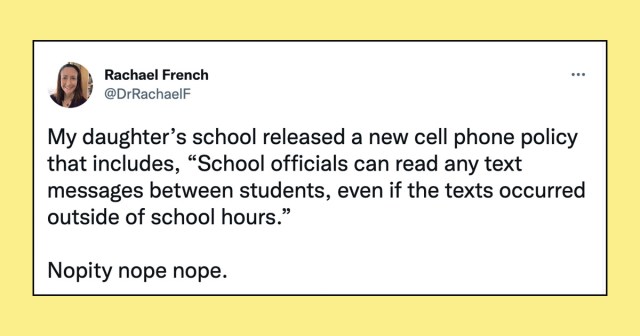This school’s cell phone policy has raised some eyebrows
Kids everywhere are headed back to school, and that means parents are being inundated with emails about new policies, dates to make note of, and a slew of other important reminders. But one mom shared her daughter’s school’s new cell phone policy, which has now gone viral for its concerning stipulation.
Dr. Rachael French (@DrRachaelF) took to Twitter to share this new policy, saying officials have stated that they can read “any text messages between students, even after school hours.”
https://twitter.com/DrRachaelF/status/1558250615813263360?s=20&t=vBsT-WjP8_-31tMbETOeqg
French, a professor of biology at San Jose State University in California, further clarified what she told her daughter when this new policy came out. “Your phone is my personal property,” she said. “If someone asks to read your texts, you tell them to call me and ask.”
Me to my daughter: “Your phone is my personal property. If someone asks to read your texts, you tell them to call me and ask.”
— Rachael French (@DrRachaelF) August 13, 2022
People were quick to add their opinions on the matter via Twitter, stating that someone should always be checking a child’s phone given the rise of cyberbullying and other online dangers. To this, French was crystal clear: “(Oh, people, *I* read her texts and discord threads sometimes. Usually only because she asks me too, but we have a blanket policy where if I ask she has to show it to me. There’s a difference between me asking and the school asking.)”
It struck up a lively debate with some educators and parents supporting the school’s policy, saying the intent would be if a student’s safety was in question. Others believed it was a violation of privacy to demand to see anyone’s phone, including and especially children.
(Oh, people, *I* read her texts and discord threads sometimes. Usually only because she asks me too, but we have a blanket policy where if I ask she has to show it to me. There’s a difference between me asking and the school asking.)
— Rachael French (@DrRachaelF) August 13, 2022
Similarly, the intent may be genuine, but there are too many times school administrators have gotten things wrong to assume it will be used only in safety situations. “It’s very easy to defend a policy if you only assume people will always do the right thing,” one commenter said. “Unfortunately history has taught us that actually people often do the right thing to serve their own agendas… agendas that often have nothing to do with educating kids.”
Whether something is legal is different than whether it is moral are correct. And things can be very inconvenient when they become public even if they were legal.
— Rachael French (@DrRachaelF) August 13, 2022
French eventually decided to finish the online debate about the legality of the new policy, saying: “Whether something is legal is different than whether it is moral or correct. And things can be very inconvenient when they become public even if they were legal.”











